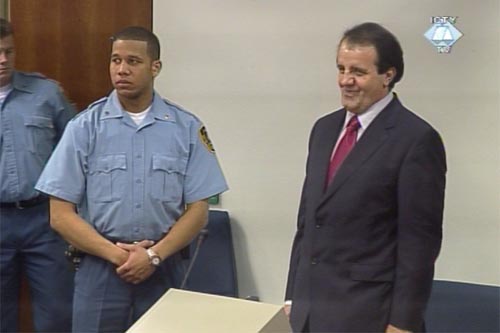Home
SEFER HALILOVIC NOT GUILTY OF CRIMES IN GRABOVICA AND UZDOL
Applying the principle of international criminal law that a commander cannot be held responsible for the crimes of persons who were not under his command at the time the crimes were committed, the Trial Chamber concluded that Sefer Halilovic was not guilty on any of the counts of the indictment charging him, on the basis of command responsibility, with violations of laws and customs of war because he failed to prevent or punish the crimes committed by BH Army members subordinate to him
 Sefer Halilovic during the judgment and sentencing hearing
Sefer Halilovic during the judgment and sentencing hearing The Trial Chamber has concluded that the prosecution failed to prove beyond reasonable doubt that Sefer Halilovic was de jure or de facto commander of Operation Neretva 93 and that he had effective control over BH Army units that committed the crimes against Croatian civilians in the villages of Grabovica and Uzdol in September 1993. The Chamber consequently cleared him of all charges of murder, qualified as a violation of laws and customs of war, and ordered his immediate release.
Presiding Judge Liu Daqun read out the summary of the judgment in court. The judgment states that it has been proven beyond reasonable doubt that war crimes were really committed in the villages of Grabovica and Uzdol, where civilians who did not participate in the hostilities – the conflicts between BH army and HVO forces – were brutally murdered. The Chamber accepted the evidence presented by the prosecution that thirteen civilians were killed in Grabovica and another twenty-five in Uzdol. None of them had actively participated in the fighting. The Chamber thus rejected the claims made by the defense that the victims died in the HVO shelling or were caught in crossfire between the two sides.
However, as Judge Daqun noted in the summary, the task of the Chamber is not solely to determine whether the crimes alleged in the indictment actually happened, but “ultimately is to determine whether the accused bears individual criminal responsibility for those crimes”.
Having analyzed the evidence, the Chamber concluded that the prosecution failed to prove beyond reasonable doubt that Sefer Halilovic was in fact the commander of Operation Neretva 93. On the basis of the order issued by Rasim Delic, and the role the accused played in the area in September 1993, the Chamber concluded that Halilovic was Team Leader of an Inspection Team and that his function was not to command, but to "coordinate and control" the combat operations. His powers were thus limited to "implementing the instructions received from Rasim Delic".
The Chamber concludes that Zulfikar Alispago issued the combat order for the attack on Grabovica. The unit of the 9th Motorized Brigade whose troops committed the crime in the village was under his command. The Chamber assesses that the prosecution presented "insufficient" evidence to establish that Alispago was Halilovic's subordinate.
The Chamber finds that the crime in Uzdol was committed by forces under the command of Enver Buza, commander of the Prozor Independent Battalion. As in the case of Alispago, the Chamber concludes there is insufficient evidence that Buza was subordinate to Halilovic.
The Chamber also concludes that no evidence was presented that Halilovic "had material ability to punish" the perpetrators of the crimes in Grabovica and Uzdol.
Applying the principle of international criminal law that a commander cannot be held responsible for the crimes of persons who were not under his command at the time the crimes were committed, the Trial Chamber concluded that Sefer Halilovic was not guilty on any of the counts of the indictment charging him, on the basis of command responsibility, with violations of laws and customs of war because he failed to prevent or punish the crimes committed by BH Army members subordinate to him.
